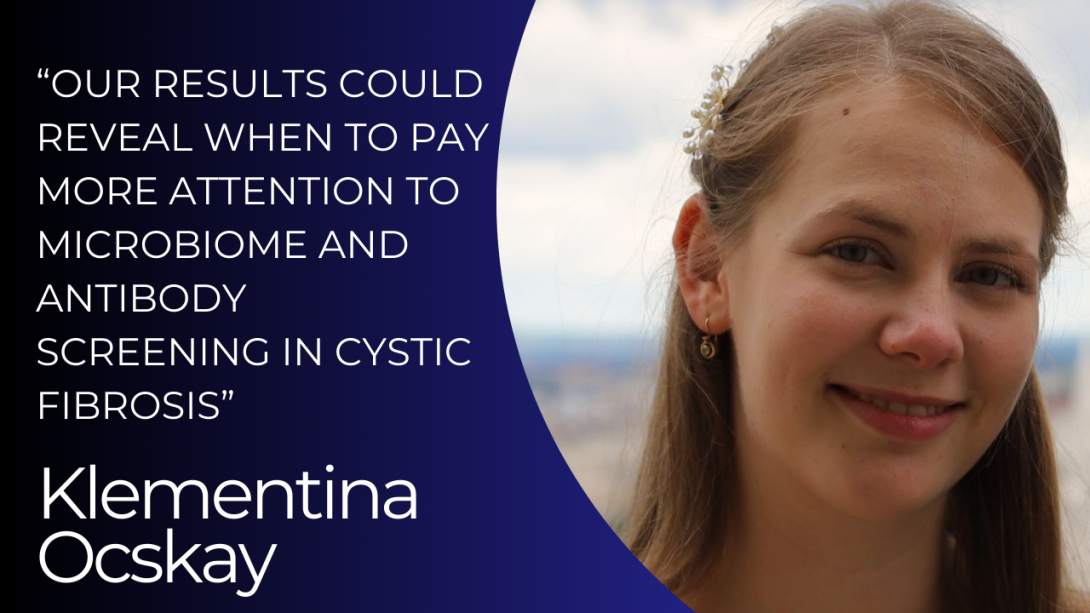
She is a supervisor for two PhD students, both researching topics related to cystic fibrosis. Their investigations could lead to an improved therapy for this disease, enhancing the quality of life for patients. In October, Klementina Ocskay was named the Supervisor of the Month.
Klementina Ocskay was a PhD student under the supervision of Prof. Dr. Péter Hegyi and Dr. Andrea Párniczky at the University of Pécs Medical School. She defended her thesis last fall, focusing on gastroenterology. “I think translational medicine is very important, which is why I started my PhD program right after finishing university. I felt there was a knowledge gap at the university training, we didn't learn how to apply scientific evidence and implement it in practice.”
Dr. Ocskay is currently working as a postdoctoral research physician at Heim Pál National Pediatric Institute with Dr. Párniczky. They are joint supervisors of two PhD students in the CTM program, Blanka Bódy and Regina Molnár. Two student researchers, Beatrix Riba and Boróka Varga are also part of the team. “We're working on cystic fibrosis, which is the most common genetic disorder among Caucasians, affecting approximately 550 Hungarians currently. We have a patient registry for scientific purposes, which provides a well-organized, large database of clinical data dating back to 2018. This creates the framework for the analyses of our PhD students. In connection with this, we are also conducting meta-analyses to assess the published evidence and identify knowledge gaps in cystic fibrosis literature. Our research is important to provide further research directions and potential solutions for gastrointestinal manifestations of cystic fibrosis and cystic fibrosis-related diabetes.”
One of Dr Ocskay's PhD students, Regina Molnár, is investigating the role of autoimmunity in the development of cystic fibrosis-related diabetes. Her other student is Blanka Bódy who is investigating the connection of gut microbiome changes with sugar metabolism and diabetes in cystic fibrosis. Both have previously worked as student researchers and have co-authored publications, which is a huge advantage. “Their topics are very interesting. There is relatively little information on these questions regarding cystic fibrosis. At the same time, the roles of autoimmunity and the microbiome in type 1 and type 2 diabetes are already proven. First, we are summarizing the literature on these topics in meta-analyses. Afterwards, we will address the remaining questions with a more detailed analysis based on our own data.” The results could shed light on when to pay more attention to the patient's microbiome and antibody testing. In the future, therapeutic microbiome alterations – including fecal transplantation, pre- and probiotics – could open a new chapter in the therapy of cystic fibrosis. Antibody measurements could compliment screening protocols for cystic fibrosis-related diabetes and help identify high-risk patients.
There are also long-term plans for Dr Ocskay and her team, next year they would like to start a clinical trial with continuous glucose monitoring. Their goal is to provide better alternatives to the standard oral glucose tolerance test currently used in diabetes screening. This method poses a serious burden on patients requiring fasting and multiple venous blood samples and it cannot be formed at young ages. Also, the reproducibility and accuracy of the results are questionable. On the other hand, continuous glucose monitoring is much more convenient and precise, but its use has to be validated in cystic fibrosis. Dr. Ocskay and the Cystic Fibrosis Research Team at Heim Pál National Pediatric Institute will be contributing to these cutting-edge investigations in cystic fibrosis research.
(Szabó Emese)